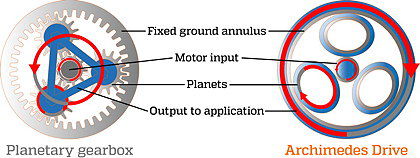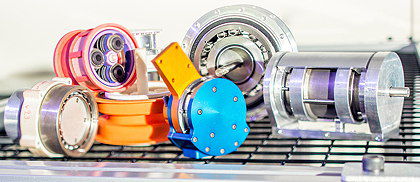- Home » News » Technology News
Friction-based speed-reducing technology challenges gears

A Dutch start-up has developed an alternative speed-reducing technology to gears which, it claims, can deliver higher precision, stiffness, torque densities and efficiencies, at a lower cost and with shorter lead times. Delft-based IMSystems adds that its Archimedes drive is compact, lightweight and backlash-free and can achieve ratios of 10,000:1. IMS is targeting the drive in particular at robots, but it could have other applications.
The drive is the brainchild of IMS’ American founder, Jack Schorsch, who encountered the limitations of conventional gear technologies when working on bionics and prosthetics in the US. Later, while studying for a PhD at Delft University of Technology, he came up with the idea for the new drive.
“The agile and accurate robots of the future imagined by engineers are being hampered by the choice of gears,” says Schorsch. “They are too bulky, heavy and imprecise. Plus, the best gears are prohibitively expensive; they’re custom-made, making supply extremely unreliable. We call it the speed reducer problem.”
Unlike conventional gears, the new compound drive does not rely on cogs with fragile teeth. Instead, frictional contact transforms speed into torque. Flexrollers – made from smooth, hollow steel cylinders – compress and transmit rotational power in the centre to a rotating annulus, which acts as the output. The design can produce ratios of up to 10,000:1 in a single compact stage – 10,000 rotations of an input from a drive motor will lead to one rotation of the Archimedes drive output, but with 10,000 times the power. IMS claims this is 25 times more than the best available technology.
Because the drive harnesses traction rather than relying on gear teeth, it exhibits zero backlash – the jolt caused by the small gaps between gear teeth – making it ideal for precision applications such as robots.
The lack of gear teeth also makes the Archimedes drive almost maintenance-free – unlike conventional gears, there is no need for lubrication.
IMS believes that its technology could also help solve another problem affecting conventional gears, especially in robotics applications – long lead times and high prices. With industrial robots typically containing six gears, and advanced surgical robots needing 32, gears account for at least a third of the hardware costs of a robot.

The Archimedes drive is said to be highly manufacturable. Its simple design should result in competitive pricing, making it highly attractive for a wide range of applications, especially robots. The drive is protected by worldwide patents.
IMSystems has already attracted €1m of seed funding, allowing it to fine-tune its drive and to complete pilot installations in the robotics, automotive, power generation and aerospace sectors. It is now raising a further €3.5m in venture capital, which will allow it to put its drive into volume production. The company says it is currently working with two of the world’s largest industrial robotics companies.
A former Google Robotics engineer, Bruce Schena, who is acting as an advisor to IMSystems, points out that “the overwhelming majority of robotic arms being sold today use technology that was invented in 1957, the same year that Sputnik was launched… Robotic evolution has highlighted the need for reducers that can provide higher stiffness, higher efficiency, higher precision, higher torque density, lower cost and more responsive delivery than the venerable, though dated, ‘strain-wave’ solution.
“I have experienced this challenge first hand many times, having been involved with, and lead, numerous robotic-arm design efforts, including the gold-standard device used in robotic surgery,” Schena adds. “The Archimedes drive from IMS represents, finally, a step-change in affordable speed reduction, capable of enabling higher-performance, lower-cost robot arms for the next 60 years.”






